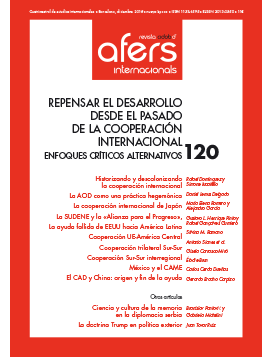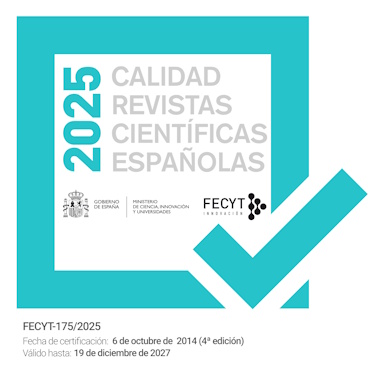Trilateral South-South cooperation for development: towards a decolonisation of solidarity
Keywords:
trilateral South-South cooperation, development, solidarity, Brazil, Mozambique, World BankAbstract
Revista CIDOB d’Afers Internacionals, nº 120
Quadrimestral (October-December 2018)
ISSN:1133-6595 | E-ISSN:2013-035X
DOI: doi.org/10.24241/rcai.2018.120.3.147
Trilateral South-South Cooperation (TSSC) for development has generated great debate over whether these alliances constitute a new paradigm for development or merely disguise a new form of imperialism. Beyond categorisations, this paper presents a more nuanced image and examines the focus of TSSC solidarity, specifically, the intrinsically political nature of development and the unequal power relations at its heart. Starting with the TSSC memorandum of understanding (MoU) between Brazil, Mozambique and the World Bank, the narratives are analysed of agricultural development and the social imaginaries that support it in order to better understand the patterns and motivations of solidarity. By showing the colonial, capitalist and patriarchal rationale that persists in the conception of solidarity used in the current development framework, this paper proposes the decolonisation of this concept.
>> The full text articles of this issue are available only in Spanish language
References
Altieri, Miguel A. y Bravo, Elizabeth. «The Ecological and Social Tragedy of Crop-based Biofuel Production in the Americas». En: Jonasse, Richard (ed.). Agrofuels in the Americas. Oakland, CA: Food First Books, 2009, p. 15-24.
Amanor, Kojo. «South–South cooperation in Africa: Historical, geopolitical and political economy dimensions of international development». IDS Bulletin, vol. 44, n.° 4 (2013), p. 20-30.
Amanor, Kojo y Chichava, Sérgio. «South-South Cooperation, Agribusiness, and African Agricultural Development: Brazil and China in Ghana and Mozambique». World Development, vol. 81, (2016), p. 13-23.
Amorim, Celso. «Brazil is too important to stay out of global issues». Instituto Lula (5 de julio de 2016) (en línea) http://www.instituto lula.org/en/brazilis-too-important-to-stay-out-of-global-issues-says-celso-amorim
Cabral, Lídia; Favareto, Arilson; Mukwereza, Langton y Amanor, Kodjo. «Brazil’s Agricultural Politics in Africa: More Food International and the Disputed Meanings of ‘Family Farming’». World Development, vol. 81 (2016), p. 47-60.
Carrasco-Miró, Gisela. «EcoSImies of Care: A Proposal for Decolonizing ‘Sustainable Development’». Insurgencies from the South and Human Right: From the European South, n.° 2 (2017), p. 89-108.
Cheru, Fantu. «Emerging Southern Powers and New Forms of South–South Cooperation: Ethiopia’s Strategic Engagement with China and India». Third World Quarterly, vol. 37, n.° 4 (2016), p. 592-610.
Clements, Alice Elisabeth y Mançano Fernandes, Bernardo. «Land Grabbing, Agribusiness and the Peasantry in Brazil and Mozambique». Agrarian South: Journal of Political Economy, vol. 2, n.° 1 (2013), p. 41-69.
DATALUTA. «Relatorio Brasil 2011». Núcleo de Estudos, Pesquisas e Projetos de Reforma Agrária, (octubre de 2012) (em línea) http://docs.fct.unesp.br/nera/projetos/dataluta_brasil_2011.pdf
ECOSOC. «The Evolution of South-South Development Cooperation: Its Role in the Implementation of the 2030 Agenda and the Paris Agreement on Climate Change». DCF Policy Briefs, n.° 17 (septiembre de 2017).
Escobar, Arturo. Encountering Development: The Making and Unmaking of the Third World. Princeton: Princeton University Press, 1995.
Escobar, Arturo. «Thinking-Feeling with the Earth: Territorial Struggles and the Ontological Dimension of the Epistemologies of the South». Revista de Antropología Iberoamericana, vol. 11, n.° 1 (2016), p. 11-32.
Fanon, Frantz. The Wretched of the Earth. Nueva York: Grove Press, 1963.
Gaztambide-Fernández, Rubén A. «Decolonization and the pedagogy of solidarity». Decolonization: Indigeneity, Education & Society, vol. 1, n.° 1 (2012), p. 41-67.
González, Erika; Hernández, Juan y Ramiro, Pedro. «Regular las empresas para defender los derechos humanos: un desafío global». Pueblos. Revista de información y debate, n.° 76 (febrero de 2018) (en línea) http://www.revistapueblos.org/blog/2018/03/05/regular-a-las-empresas-para-defender-los-derechos-humanos-un-desafio-global/Human Rights Watch. «How Can We Survive Here? The impact of Mining on Human Rights in Karamoja, Uganda». Human Rights Watch, (febrero
de 2014) (en línea) https://www.hrw.org/sites/default/files/reports/uganda0214_insertWithcover.pdf
IDI-Inclusive Development International. «Unjust Enrichment: How the IFC Profits from Land Grabbing in Africa». IDI, (abril de 2017) (en línea) https://www.inclusivedevelopment.net/wp-content/uploads/2017/04/OutsourcingDevelopment-Africa.pdf
IFAD-International Fund for Agricultural Development. «IFAD’s Approach to South-South and Triangular Cooperation». IFAD, (23 de noviembre de 2016) (en línea) https://webapps.ifad.org/members/eb/119/docs/EB-2016-119-R-6.pdf
JA! Justica Ambiental. «Justiça Ambiental/FOE Mozambique’s Position on the ProSAVANA Program». JA4Change (28 de enero de 2013) (en línea) https://ja4change.wordpress.com/2013/01/28/justica-ambientalfoe-mozambiquesposition-on-the-prosavana-program/
JICA-Japan International Cooperation Agency. «Investigation Report. The Support for Agricultural Development Master Plan for Nacala Corridor. In The Republic of Mozambique». JICA, (noviembre de 2017) (en línea) https://www.jica.go.jp/english/our_work/social_environmental/objection/c8h0vm0000b81di4-att/mozambique_01_06.pdf
Kapoor, Ian. The Postcolonial Politics of Development. Londres: Routledge, 2008.
Kari-Oca 2 Declaration. «Indigenous Peoples Conference on Rio+20 and Mother Earth». Indigenous Enviromental Network, (17 de junio de 2012) (en línea) http://www.ienearth.org/docs/DECLARATION-of-KARIOCA-2-Eng.pdf
Klein, Naomi. This Changes Everything. Nueva York: Simon & Schuster, 2014.
Mohanty, Chandra. «Under Western Eyes: Feminist Scholarship and Colonial Discourse». Feminist Review, n.° 30 (1988), p. 61-88.
Mohanty, Chandra. «Preface: Toward a Decolonial Feminism for the 99 Percent». En: McLaren, Margaret (ed.). Decolonising feminism: Transnational Feminism and Globalization. Londres: Rowman Littlefield International, 2017, p. vii–xi.
Ouma, Stefan. «Situating Global Finance in the Land Rush Debate: A Critical Review». Geoforum, vol. 57 (2014), p. 162-166.
OXFAM. Our Land, Our Lives: Time Out on the Global Land Rush. OXFAM Briefing Note, (octubre de 2012) (en línea) https://www.oxfam.org/sites/www.oxfam.org/files/bn-land-lives-freeze-041012-en_1.pdf
OXFAM. Owning the Outcomes: Time to Make the World Bank Group’s Financial Intermediary Investments More Accountable. OXFAM Briefing Note, (octubre de 2016) (en línea) https://www.oxfam.org/sites/www.oxfam.org/files/file_attachments/bn-ifc-owning-outcomes-031016-en_0.pdf
People’s Declaration. «No to ProSavana Campaign: Peoples’ Declaration». Farmlandgrab (25 de octubre de 2017) (en línea) https://www.farmlandgrab.org/post/view/27603-no-to-prosavana-campaign-peoples-declaration
Pérez Orozco, Amaia. Subversión feminista de la economía. Madrid: Traficantes de sueños, 2014.
Pérez Orozco, Amaia. Aprendizajes de las resistencias feministas latinoamericanas a los tratados de comercio e inversión. Madrid: Observatorio de Multinacionales en América Latina–Paz con Dignidad, 2017.
Plaza, Beatriz y Ramiro, Pedro. Justicia privatizada: El Estado español y los mecanismos de resolución de controversias inversor-Estado, Ecologistas en Acción. Madrid: Observatorio de Multinacionales en América Latina–Paz con Dignidad, 2016 (en línea) http://omal.info/IMG/pdf/justicia_privatizada_-_informe_final.pdf
Relatório de Insustentabilidade. «Relatório de Insustentabilidade 2015». Instituto PACS, (2015) (en línea) www.pacs.org.br/files/2015/04/Relatirio_pdf.pdf
Rincón, Luis Felipe y Mançano, Bernardo. «Agrarian Change by the BRICS’ Large-Scale Investments in the Global Agrarian South: Focus on Brazil, Colombia and Mozambique». The 5th International Conference of the BRICS Initiative for Critical Agrarian Studies, (13-16 de octubre de 2017) (en línea) https://www.iss.nl/sites/corporate/files/2017-11/BICAS%20CP%20 5-42%20Rincon%20and%20Fernande.pdf
Said, Edward. Orientalism. New York: Pantheon Books, 1978
Scoones, Ian; Amanor, Kojo; Favareto, Arilson y Qi, Gubo. «A New Politics of Development Cooperation? Chinese and Brazilian Engagements in African Agriculture». World Development, vol. 81 (2016), p. 1-12.
Shankland, Alex y Gonçalves, Euclides. «Imagining Agricultural Development in South-South Cooperation: The Contestation and Transformation of ProSAVANA». World Development, vol. 81 (2016), p. 35-46.
The Economist. «Brazilian Agriculture: The Miracle of the Cerrado». The Economist, (26 de agosto de 2010) (en línea) https://www.economist.com/node/16886442
Treguer, David y Pehu, Eija. «Moving toward a sustainable landscape approach to development». Agriculture and environmental services note, n.° 12 (2014) (en línea) http://documents.worldbank.org/curated/en/819501468151511677/Moving-toward-a-sustainable-landscape-approach-to-development
Tuck, Eve y Yang, Wayne, K. «Decolonization Is Not a Metaphor». Decolonization: Indigeneity, Education & Society, vol. 1, n.° 1 (2012), p. 1-40.
UN-United Nations. «Resolution Adopted by the General Assembly. Transforming Our World: The 2030 Agenda for Sustainable Development». UN, A/RES/70/1, (25 de septiembre de 2015) (en línea) http://www.un.org/en/development/desa/population/migration/generalassembly/docs/globalcompact/A_RES_70_1.pdf
United Nations Human Rights Council. «Open-ended intergovernmental working group on transnational corporations and other business enterprises with respect to human rights». OHCHR, (2018) (online) http://www.ohchr.org/EN/HRBodies/HRC/WGTransCorp/Pages/IGWGOnTNC.aspx
UNOSCC-United Nations Office for South-South Cooperation. «About South-South and Trilateral Cooperation». UNOSCC, (2018) (en línea)
https://www.unsouthsouth.org/about/about-sstc/
WB-World Bank. «Awakening Africa’s Sleeping Giant Prospects for Commercial Agriculture in the Guinea Savannah Zone and Beyond». (2009) (en línea) https://siteresources.worldbank.org/INTARD/Resources/sleeping_giant.pdf
WB-World Bank. «Rising Global Interest in Farmland». (2011) (en línea) https://siteresources.worldbank.org/DEC/Resources/Rising-Global-Interest-in-Farmland.pdf
WB-World Bank. «Collaborating Across Continents: Mozambique, Brazil and the World Bank Deepen South-South Cooperation on Sustainable Rural Development». WB, (15 de mayo de 2017) (en línea) http://www.worldbank.org/en/news/feature/2017/05/15/collaborating-across-continents-mozambique-brazil-and-the-world-bank-deepen-south-south-cooperation-on-sustainable-rural-development
WFP-World Food Programme. «South-South and Triangular Cooperation for Food Security and Nutrition». WFP, (octubre de 2016) (en línea) http://documents.wfp.org/stellent/groups/public/documents/communications/wfp289623.pdf?_ga=1.239290571.938730172.1483120418













